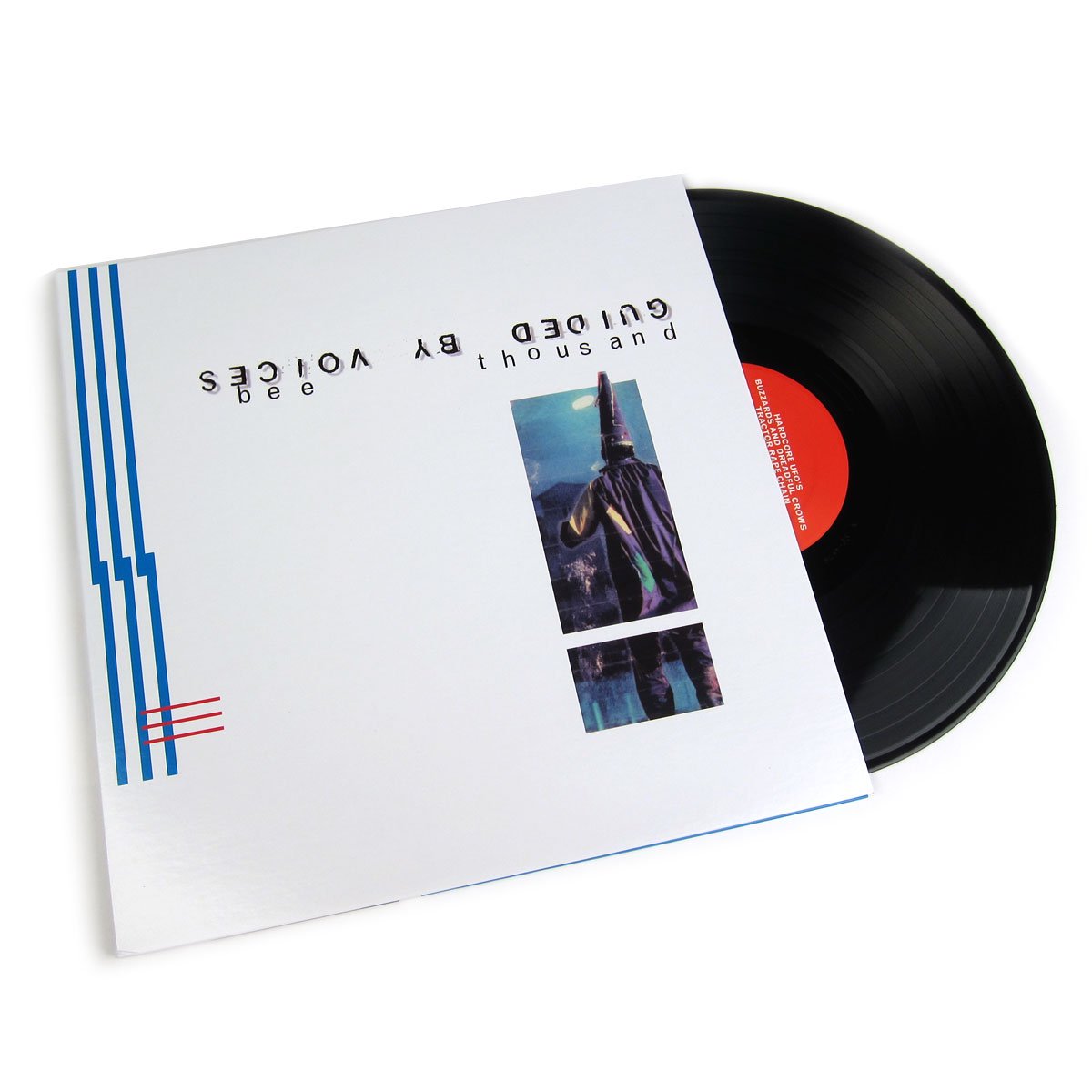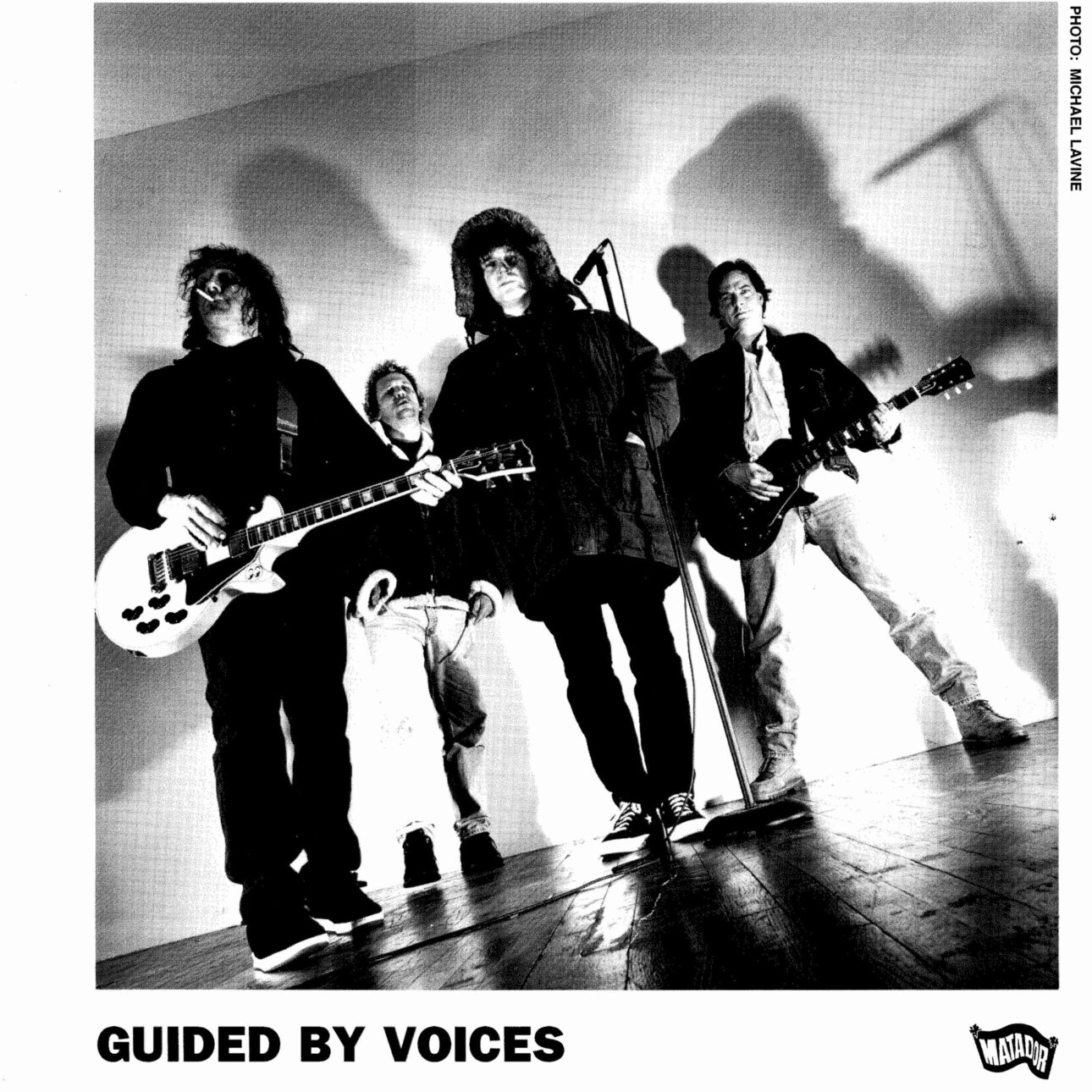Hearing Voices

Released on June 21st, 19-Something and Four, Bee Thousand, the seventh album by Dayton, Ohio’s Guided by Voices, was ushered into the time-and-space sphere. The record may clock in at 36:35, but in reality—whatever that even is—Bee Thousand has proved to be a timeless piece, able to exist as an artifact of a certain musical genre known as “lo-fi indie rock,” while also retaining its immediacy, as evidenced in the opening track, “Hardcore UFO’s.”
Over a jangly, guitar-driven tune with a pulsating drum beat, Robert Pollard croons the opening lyrics from a second-person perspective. You (me) are hanging on the roof of the house, staring upwards towards infinity, hoping for a close encounter of the amplified kind. UFOs are unencumbered by that whole space-and-time thingy.
The final line of the first stanza is “I’ll be with you, without you, again.”
Then, a magical moment occurs, or I should say has been occurring, and will continue to occur until God knows when. At the :56 second mark of the song, just before things kick into high gear, one of the four tracks used to record the song drops out. How this happened remains a mystery. Was it due to faulty equipment? Did somebody accidentally press Record and Play at the same time? We will never know. The How is unimportant, what matters is it happened.
Every time I listen to the song, that dropout happens. Every future play, it will happen. If scholars or stoners ever want to get to the bottom of the popularity of listening to sub-par fidelity music then they should look no further than this moment. The creation and the act of creating have been synchronized. Mistake or divine intervention, those three seconds, before the second guitar reappears, proves that time is purely subjective. In that exact moment I exist on two parallel planes. 2024 and 1994, at once a middle-aged teenager.

Let’s talk to Robert.
SPIN: Bee Thousand turns 30 this year. Did you have a hunch that it would be the “breakthrough” album?
Robert Pollard: It’s actually just a collection of re-worked, old songs. This one broke through and found a lot of important ears because of its diversity and sheer volume of very good songs. There are a lot of different fields of sound, and a lot of it’s actually pretty hard to listen to. That may be part of the appeal. I wanted it to sound like a collection of poorly recorded Beatles White Album demo outtakes.
The band started employing the 4-track machine on Propeller. What is it about the lo-fi aesthetic?
The lo-fi thing to me at first came out of economical necessity. But then I started really digging the immediacy and the crazy shitty overall sounds you could get. A lot of diversity within a limited space. You rely on live, in-the-room sound and moving things around. You incorporate extraneous elements like field recordings and fucked-up film extracts detuned to fit the key of song. Drop-outs, warp effects, strange percussive devices, things like that, and then you cram everything into four or five or six tracks.
You and I were once in Cincinnati, and out of the blue you started singing a song you dubbed “Hat Vertigo,” after noticing how many dudes in that bar were wearing hats. You sang a verse and chorus and then it floated into the ether. Do you remember doing that? How many great songs are on old tapes or lyrics in notebooks?
I don’t remember “Hat Vertigo,” but I like that.
No telling how many of those there are, where they are, or if recorded takes exist. Also there are a lot of aborted lyrics and ideas in notebooks, and I’m constantly making up songs and singing them into people’s phones when we’re out drinking and being silly.
How early in life did you think, “I can write a song!”?
I was writing hits for neighborhood buddies when I was 7 or 8 years old. All a capella but with structure and very derivative of AM radio hits of that time. 1965-66 Herman’s Hermits, Beatles, Dave Clark Five, Gary Lewis and the Playboys. I had songs like “We Are From the Planet Mars,” “Wolf Man,” “Eggs Make Me Sick,” “Imagination,” to name a few.
You once said recording each song of Bee Thousand took roughly a half-hour. What took so long?
It took roughly a half-hour each because we had to change the setting. Rearrange the mic-ing set ups and positions. Get different effects. Whatever. Do another shot. Smoke a joint.

You also once said, “If you write a song and your mom likes it, shit-can it immediately.” Does that ethos remain?
I actually said “grandmother,” but it pretty much equally applies to mother or even sister and a lot of times friends. The first person to hear a song now is my wife, Sarah. Then Travis [Harrison], then the band.
“Girls of Wild Strawberries” I assume was at least half-concocted while watching the Bergman classic.
Yes, it definitely was inspired by the Bergman film, which I think is beautiful. “Imaginary Queen Anne” was inspired by an episode of The Tudors about King Henry VIII, when she had a flashback, end of life memory of her childhood with her brother right before she was beheaded. I’m sure there are a lot of other songs [influenced by movies].
If you could work with one director, who would it be?
Well, I was set up to work with Steven Soderbergh on a musical adaptation of the life of Cleopatra called Cleo, but it ended up not happening. He even stayed at my house to work on altering lyrics from some of my better-known songs to match the script. Anyway, it fell through. It was a big-ass waste of my time. Now I don’t want to work with any directors on a movie soundtrack. Fuck that. Just make albums. They’re better than trying to force songs into a movie soundtrack anyway.
No disrespect to Steven Soderbergh. I don’t think it was his fault. And that’s not to say if something really alluring came up I wouldn’t change my mind.
Do you remember your reaction to hearing the tape cut out on “Hardcore UFO’s”?
We just thought it sounded cool and it went along with our lo-fi aesthetic. Also we justified it as being interference from hardcore UFOs.
GBV began life in a proper studio, and then came the lo-fi glory years. Now y’all are really letting your prog flag fly. You’ve released some country ditties under the name Cash Rivers. Any other genres you feel like tackling?
You know, I thought about a crooner record, but I’ve got this eternal child-like perspective when it comes to making music. I just keep writing and recording songs as if I were in high school or college, and that means rock.
What is the recording process? How much input do the other band members supply?
The others, including Travis, have a tremendous amount of input. In fact, unlike in the past, they pretty much do everything except for writing the songs and doing the vocals, which I add to the final mixed instrumentals.
Do you still record demos on your boombox?
That’s exactly what I do!
Read SPIN’s original 1994 review of Guided by Voice’s Bee Thousand here.
Link to the source article – https://www.spin.com/2024/12/hearing-voices/
Recommended for you
-
Roland AIRA Compact J-6 Portable Song Creation Machine with Professional Sound and Features | JUNO-60 Synth Engine & Presets | Chord Sequencer | Effects
$179,97 Buy From Amazon -
Otamatone Special Edition Sanrio (Aggretsuko – Rage) – Fun Electronic Musical Toy Synthesizer Instrument by Maywa Denki (Official Licensed) [Includes Song Sheet and English Instructions]
$44,99 Buy From Amazon -
Cable Matters 2-Pack 5 Pin DIN MIDI Cable, 5 Pin MIDI Cable – 6 Feet
$9,99 Buy From Amazon -
D’Addario Guitar Strings – XL Nickel Electric Guitar Strings – EXL110-3D – Perfect Intonation, Consistent Feel, Reliable Durability – For 6 String Guitars – 10-46 Regular Light, 3-Pack
$0,00 Buy From Amazon -
String Swing Guitar Wall Mount, Guitar Hanger, Wall Guitar Mount, Guitar Holder Hook for Wall, Fits All Size Guitars, Acoustic, Electric, Bass, Black Walnut Hardwood – Made in USA
$14,99 Buy From Amazon -
Kids Drum Set Eastar 3-Piece for Beginners, 14 inch Drum Kit with Adjustable Throne, Cymbal, Pedal & Two Pairs of Drumsticks, Junior Drum Set with Bass Tom Snare Drum, Metallic Sky Blue
$129,99 Buy From Amazon -
KORG MS2000 – Large Original WAVE Samples Studio Library
$14,99 Buy From Amazon -
Yamaha YCR-2310III Student Cornet – Gold Lacquer
$1.577,00 Buy From Amazon














Responses